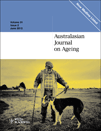
AUSTRALASIAN JOURNAL ON AGEING
Scope & Guideline
Connecting interdisciplinary insights for better ageing.
Introduction
Aims and Scopes
- Geriatric Medicine and Clinical Care:
The journal publishes research on the clinical aspects of geriatric medicine, including assessment tools, treatment protocols, and outcomes related to various medical conditions affecting older adults, such as dementia, frailty, and chronic diseases. - Psychosocial Aspects of Ageing:
Research exploring the mental health, social well-being, and quality of life of older adults, including studies on loneliness, social isolation, and the impact of community support systems. - Innovative Care Models:
The journal emphasizes studies on new models of care, such as integrated and person-centred approaches, aimed at improving the quality of life and care for older adults in various settings. - Multidisciplinary Approaches:
A significant focus is placed on collaborative practices among healthcare professionals, addressing the need for comprehensive care that includes medical, psychological, and social perspectives. - Policy and Systemic Issues:
The journal discusses the implications of policies affecting aged care services, including quality standards, workforce issues, and the impact of reforms on service delivery. - Cultural and Ethnic Considerations:
Research that highlights the unique challenges and needs of diverse populations, including Indigenous and culturally diverse older adults, is a critical area of focus.
Trending and Emerging
- Frailty and Comprehensive Geriatric Assessment:
Research on frailty has gained significant attention, focusing on its assessment, implications for patient outcomes, and interventions to manage frailty in older adults. - Digital Health and Telehealth Innovations:
The surge in telehealth and digital health solutions, particularly in response to the COVID-19 pandemic, has led to increased research on their effectiveness and integration into aged care. - Mental Health and Well-Being:
There is a growing emphasis on the mental health of older adults, including studies on depression, anxiety, and the psychosocial impacts of social isolation. - Palliative and End-of-Life Care:
Research focusing on improving palliative care practices and understanding the needs of older adults at the end of life has become increasingly prominent. - Culturally Sensitive Care:
Emerging studies highlight the importance of culturally sensitive approaches in aged care, addressing the unique needs of Indigenous and culturally diverse populations. - Health Equity and Access to Care:
There is an increasing focus on health equity, exploring barriers to care for marginalized populations and strategies to improve access to services for older adults.
Declining or Waning
- Traditional Institutional Care Models:
There has been a noticeable shift away from research focused solely on traditional nursing home care models, as the emphasis has moved towards community-based and integrated care solutions for older adults. - Basic Medical Interventions:
Research centered on basic medical interventions for older adults, such as standard pharmacological treatments, appears to be declining as more complex, holistic approaches to care gain traction. - Ageing and Technology:
While technology's role in ageing care was once a growing field, the focus has shifted to more practical applications of technology in enhancing care rather than theoretical discussions about its potential. - General Ageing Research:
The broad field of ageing research without a specific focus, such as demographic studies or general health surveys, is becoming less prominent as more specialized and targeted studies emerge.
Similar Journals
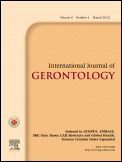
International Journal of Gerontology
Empowering research for a healthier, aging society.International Journal of Gerontology is a distinguished peer-reviewed journal dedicated to advancing the field of gerontology and addressing the multifaceted challenges associated with aging. Published by the Taiwan Society of Geriatric Emergency & Critical Care Medicine, this innovative journal has been an open-access platform since 2018, ensuring that vital research is accessible to a global audience. With an ISSN of 1873-9598, it serves as a crucial resource for researchers and practitioners focused on the biological, psychological, and social aspects of aging. The journal is indexed in Scopus with a rank of #103/116 in the Medicine category (Geriatrics and Gerontology) as of 2023, placing it in the Q4 quartile—a testament to its evolving impact in the field. Spanning works published from 2007 to 2024, the International Journal of Gerontology facilitates the dissemination of critical research findings and clinical practices that inform and enhance geriatric care and research methodologies.
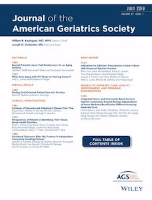
JOURNAL OF THE AMERICAN GERIATRICS SOCIETY
Shaping the Future of Aging Research and PolicyJOURNAL OF THE AMERICAN GERIATRICS SOCIETY, published by Wiley, stands as a leading resource in the field of geriatrics and gerontology. Established in 1953 and converging into a comprehensive academic platform through 2024, this esteemed journal is recognized for its high impact, holding a Q1 ranking in its category for 2023. It serves as a vital conduit for innovative research, clinical practices, and policy discussions aimed at improving the health and well-being of older adults. With a commitment to advancing geriatric medicine, the journal contributes significantly to the ongoing dialogue among researchers, healthcare professionals, and students dedicated to this rapidly evolving field. Although currently not offering open access options, the journal remains invaluable for those seeking to access pivotal studies and reviews that shape the future of geriatrics.

Journal of Population Ageing
Unveiling Insights into Ageing PopulationsThe Journal of Population Ageing, published by SPRINGER INT PUBL AG, stands as a prominent platform for the exploration and dissemination of research within the fields of demography, geography, and sociology. With an ISSN of 1874-7884 and an E-ISSN of 1874-7876, this journal navigates the complexities of population ageing, a vital topic as societies worldwide confront the implications of an ageing demographic. The journal boasts impressive Scopus rankings, including the 30th rank in Demography and a 78th percentile in Sociology and Political Science, emphasizing its significant role in academic discourse. It is highly regarded in its Q2 category quartiles for Demography, Geography, Planning and Development, and Sociology and Political Science, showcasing its relevance and scholarly impact. Although not an open-access publication, the journal's carefully curated articles aim to inform and advance knowledge, making it an invaluable resource for researchers, professionals, and students invested in understanding the multifaceted challenges associated with an ageing population. With its comprehensive scope and commitment to quality, the Journal of Population Ageing continues to contribute meaningfully to the evolving conversation on demographic trends and their societal implications.

Turkish Journal of Geriatrics-Turk Geriatri Dergisi
Transforming the landscape of aging research.The Turkish Journal of Geriatrics (Türk Geriatri Dergisi), with ISSN 1304-2947 and E-ISSN 1307-9948, is a distinguished scholarly publication dedicated to the field of geriatrics and gerontology, proudly published by the Turkish Geriatrics Society. Established to foster knowledge and research in the aging population, this journal plays a crucial role in disseminating significant findings and advancements in the medical care of elderly individuals. Since its inception in 1998, the journal has committed to high-quality, peer-reviewed articles that explore diverse aspects of geriatric medicine, contributing vital insights to practitioners and researchers alike. Although it currently holds a Q4 ranking in the category of Geriatrics and Gerontology, the Turkish Journal of Geriatrics is on an upward trajectory, making it an essential resource for those specializing in the care of older adults. Researchers and professionals are encouraged to explore its rich archive and benefit from the open-access publishing model, promoting broader access to impactful research. For those invested in the well-being of the elderly, the Turkish Journal of Geriatrics serves not only as a platform for scholarly communication but also as a catalyst for innovation in geriatric care.
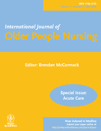
International Journal of Older People Nursing
Pioneering Research for Better Aging Solutions.The International Journal of Older People Nursing is a pivotal publication in the field of gerontology, focusing on the unique nursing care and health challenges faced by older adults. Published by WILEY and based in the United Kingdom, this journal aims to disseminate innovative research and practice insights from 2010 to 2024, making it an essential resource for academics and practitioners alike. With an impressive 2023 Category Quartile of Q2 in Gerontology, the journal ranks in the top tier of its field, placing it at 15th among 39 journals in Nursing Gerontology according to Scopus. The journal is committed to providing a platform for rigorous scientific inquiry, facilitating improvements in nursing practices, and promoting evidence-based care for older adults. Researchers, professionals, and students can benefit from the high-impact contributions that address the complexities and richness of aging, thus enhancing the quality of care and life for older populations.
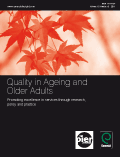
Quality in Ageing and Older Adults
Exploring the Future of Aging with ExpertiseQuality in Ageing and Older Adults is an esteemed journal published by Emerald Group Publishing Ltd, dedicated to elucidating the complexities and challenges of aging and the quality of life for older adults. With a focus on critical areas within Care Planning, Community and Home Care, and Gerontology, this journal serves as a vital resource for researchers, healthcare professionals, and students alike. Recognized for its scholarly contributions, it holds a Q2 ranking for Care Planning and Community and Home Care and maintains an impactful presence in Gerontology, further demonstrated by its Scopus rankings. Although the journal does not offer open access, its commitment to advancing knowledge in the field is underscored by its ongoing publication since 2000 and its broad scholarly reach until 2024. By fostering innovative research and practical insights, Quality in Ageing and Older Adults continues to play a crucial role in informing policy, enhancing care practices, and improving outcomes for older individuals.

AGEING & SOCIETY
Advancing Knowledge on Ageing and Its Social ImpactAGEING & SOCIETY, published by Cambridge University Press, is a premier journal focusing on the interdisciplinary study of ageing and its social implications. With an ISSN of 0144-686X and an E-ISSN of 1469-1779, this esteemed publication has established itself as a vital resource for researchers, professionals, and students in the fields of Geriatrics, Gerontology, Health Social Science, and Public Health. Its commitment to high-quality scholarly work is reflected in its impressive ranking within the top quartiles (Q1 and Q2) across multiple categories, boasting a remarkable influence in Arts and Humanities as well as Social Psychology, with Scopus rankings placing it in the 93rd percentile for Arts and Humanities (miscellaneous) and the 88th percentile in Health (social science). Despite its lack of Open Access options, this journal, with a publication timeline spanning from 1981 to 2024, encourages a broad discourse on ageing by emphasizing both the theoretical and practical aspects of societal impacts, making it an essential platform for advancing knowledge and fostering innovation in ageing studies.
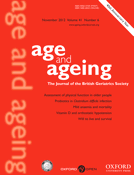
AGE AND AGEING
Pioneering Research for a Better TomorrowAGE AND AGEING is a premier peer-reviewed journal published by Oxford University Press, dedicated to advancing the field of gerontology and related medical disciplines. With its ISSN of 0002-0729 and E-ISSN 1468-2834, the journal has established itself as a critical platform for disseminating innovative research since its inception in 1972. It boasts impressive rankings within the Q1 category in Aging, Geriatrics and Gerontology, and Miscellaneous Medicine, reflecting its influential position in the scientific community. Researchers and practitioners alike value the journal's focus on the clinical, biological, and social aspects of aging, providing a multidisciplinary approach essential for addressing the challenges of an aging population. The journal maintains a significant impact factor, demonstrating its contribution to scholarly communication and knowledge dissemination. Although it does not operate under an open access model, AGE AND AGEING remains an essential resource for those committed to understanding the complexities of aging and enhancing the quality of life for older adults.

RASP-Research on Ageing and Social Policy
Cultivating Knowledge for Sustainable Ageing PoliciesRASP - Research on Ageing and Social Policy is a distinguished journal dedicated to exploring the intricate relationship between ageing populations and societal change. Published by HIPATIA PRESS and featuring an Open Access model since 2013, this journal provides invaluable insights into various aspects of social policy as it relates to older adults. As a platform for rigorous academic research, RASP caters to an interdisciplinary audience of researchers, professionals, and students, promoting the exchange of innovative ideas and evidence-based practices. The journal aims to influence policy-making and practice, ensuring that the voices of ageing populations are heard and prioritized in social discourse. With a commitment to high-quality scholarship and a focus on global and local challenges, RASP stands out as a crucial resource for those engaged in the study of ageing and social policy dynamics.

Geriatrie et Psychologie Neuropsychiatrie du Vieillissement
Exploring Innovations in Geriatric Care and NeuropsychiatryGeriatrie et Psychologie Neuropsychiatrie du Vieillissement is a pivotal academic journal dedicated to the multidisciplinary study of aging, encompassing the fields of geriatrics, neuropsychiatry, and psychological health in the elderly population. Published by JOHN LIBBEY EUROTEXT LTD, this journal fosters knowledge dissemination and innovation, contributing to the understanding of the complexities faced by aging individuals. With a broad scope that includes biological psychiatry and neuropsychology, it serves as a vital resource for researchers, healthcare professionals, and students engaged in geriatric medicine and mental health. Although currently classified in the Q4 category across various relevant medical and psychological disciplines, the journal addresses critical topics that are essential for enhancing quality of care and improving patient outcomes. Additionally, the journal is accessible via open access options, promoting wide-ranging readership and collaboration within the academic community. As the field continuously evolves, Geriatrie et Psychologie Neuropsychiatrie du Vieillissement remains commited to pushing the boundaries of research and practice in gerontology and neuropsychiatry.